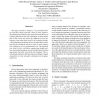Free Online Productivity Tools
i2Speak
i2Symbol
i2OCR
iTex2Img
iWeb2Print
iWeb2Shot
i2Type
iPdf2Split
iPdf2Merge
i2Bopomofo
i2Arabic
i2Style
i2Image
i2PDF
iLatex2Rtf
Sci2ools
113
click to vote
ICTAI
2003
IEEE
2003
IEEE
Engineering Optimization Using a Simple Evolutionary Algorithm
This paper presents a simple ¢¤£¦¥¨§© Evolution Strategy and three simple selection criteria to solve engineering optimization problems. This approach avoids the use of a penalty function to deal with constraints. Its main advantage is that it does not require the definition of extra parameters, other than those used by the evolution strategy. A self-adaptation mechanism allows the algorithm to maintain diversity during the process in order to reach competitive solutions at a low computational cost. The approach was tested in four well-known engineering design problems and compared against several penalty-function-based approaches and other state-of-the-art technique. The results obtained indicate that the proposed technique is highly competitive in terms of quality, robustness and computational cost.
Artificial Intelligence | Computational Cost | Evolution Strategy | ICTAI 2003 | Simple Selection Criteria |
Related Content
| Added | 04 Jul 2010 |
| Updated | 04 Jul 2010 |
| Type | Conference |
| Year | 2003 |
| Where | ICTAI |
| Authors | Efrén Mezura-Montes, Carlos A. Coello Coello, Ricardo Landa Becerra |
Comments (0)

